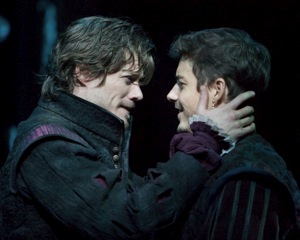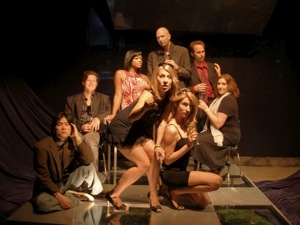-
- Admirals, generals: Repeal ‘Don’t Ask, Don’t Tell’
- Criticism mounts among gays over California ban
- Woman who got HIV in transplant sues Ill. Hospital
- Gay advocates upset at shelving of Chicago school
- NJ same-sex marriage political debate looms, but when?
- Gay arts group sues Milwaukee for discrimination
- National News Briefs
- World News Briefs
Theater
The weird, the wanton, the wishful
Published Thursday, 27-Nov-2008 in issue 1092
‘The School of Night’
Christopher Marlowe gave the Elizabethan state plenty of reasons to want him dead. Atheist, homosexual, former spy for the queen, member of a suspect group of freethinkers known as the School of Night, Marlowe even advocated the establishment of a Venetian-style republic in England.
He was a marked man and knew it, but that didn’t keep him from his libertine ways and dangerous ideas. He once expressed the opinion that “all men are fools who love not tobacco and boys,” and along with his friend Sir Walter Raleigh (Henri Lubatti) may have had an interest in alchemy and the occult.
The School of Night explores the last few months of Marlowe’s life. He died at the age of 29 of a knife wound to the eye under somewhat murky circumstances: was it a standard barroom brawl or perhaps something more politically motivated?
The Mark Taper Forum presents Peter Whelan’s The School of Night through Dec. 17. Bill Alexander, who helmed the London production, directs.
The play opens in 1592 with Marlowe (Gregory Wooddell) on his knees, praying to “Almighty Dog,” an action that in religiously closed-minded England could end in a session on the rack and a McCarthyesque demand to name names.
The plague rages in London, theaters are closed and Marlowe has taken refuge in the house of patron Thomas Walsingham (Adrian LaTourelle) and his less-than-thrilled wife Audry (Alicia Roper). He hangs out with fellow playwright Thomas Kyd (Michael Bakkensen), whose fame will rest on one play, The Spanish Tragedy; the young Shakespeare (here called Tom Stone, for unknown reasons, and played by John Sloan); and Raleigh (Henri Lubatti), who has fallen from grace with the queen and seeks a way to return to her good favor.
Whelan does a pretty fair job of portraying the time, with its political intrigues, religious bigotry and paranoia about foreign powers such as France, and of naming the problems Marlowe and his friends presented to the crown. I wish there were more showing and less telling – for example, why not a scene with the queen musing about Marlowe, and what she’d like done about him?
Breaking up all the talk is an excellent commedia dell’arte scene at the top of the second act, featuring Jon Monastero as Harlequin and Nik Toren as Pantaleone.
Alexander’s fine cast disports itself well on Simon Higlett’s attractive set. The fact that Wooddell comes off as a bit of a cipher and Shakespeare has little to do can be laid at the playwright’s feet. Lubatti has the best-written part of Raleigh and makes the most of it. Bakkensen’s Kyd, Roper’s Audry and and LaTourelle’s Walsingham are fine as well.
But Whelan’s main mistake is in trying to make this a whodunit. He goes to extraordinary lengths to provide a labyrinthine set of possibilities in which everyone has a grudge.
But we all know who did it; many audience members will know going in. What we don’t know is why, and we leave the theater still in the dark on that point.
I’d have preferred the play to end with Whelan’s nod to the fanciful theory that Marlowe faked his own death and escaped to France, where he supposedly wrote Shakespeare’s plays. If Whelan isn’t going to answer the question on everyone’s mind anyway, why not a little whimsy?
The School of Night plays through Dec. 17 at the New Mark Taper Forum. Shows Tuesday through Saturday at 8 p.m; Saturday at 2:30 p.m.; Sunday at 1 and 6:30 p.m. For more information, visit www.gaylesbiantimes.com/links/1092.
‘U.S. Drag’
In case you’re wondering, the answer is no: Gina Gionfriddo’s U.S. Drag is not about queens. Rather, it is a “paranoid urban satire” about a pair of young, moneygrubbing New Yorkers. (The title is borrowed from William S. Burroughs, who used it to describe “a peculiarly American kind of longing.”)
Winner of the 2001-2002 Susan Smith Blackburn Prize for outstanding English language play by a woman, U.S. Drag plays through Dec. 21 at ion theatre’s Lab at the Academy of Performing Arts. Claudio Raygoza directs.
Angela (Laura Bozanich) and Allison (Melissa Coleman Reed) are self-obsessed party girls recently loosed onto the world with their respective magna and summa cum laude degrees. Broke but pretty slackers, their world-owes-me-a-living and I’m-smarter-than-the-people-upstairs-making-six-figures attitudes make it difficult to find jobs commensurate with what they regard as their capabilities. As Allison puts it, “It’s hard to work for a little when what you want is a lot.”
A serial attacker in Manhattan has inspired professional do-gooder Evan (Nick Louie) to hold meetings where he counsels residents to be SAFE (Stay Away From Ed). “A good Samaritan is a dead Samaritan,” he notes. Navel-gazing novelist Christopher (Sven Salumaa) attends, looking for material for the next book. So does activist James (Colin Simon), trying to save a condemned murderess from execution. And survivor Mary (Kelly Kapczynski) just wants a man.
Angela and Allison get involved when they hear about the $100,000 reward being offered for information in the case. This pursuit sounds a lot more promising than settling for an entry-level job.
The plot meanders around, settling here on those awful party games designed to reveal intimate details about the psyche, there on the nature of truth, again on the fear of dying without getting it – whatever it is.
On a simple but wonderfully evocative set (designed and built by Raygoza and Matt Scott), Gionfriddo’s breezy dialogue pokes fun at New York paranoia, materialism, the recklessness of youth and, of course do-gooders. All of them are looking for something, or perhaps someone – even Allison, who in a quiet moment puts it this way: “I just want to matter.”
If the plot is a bit slight and flighty, the characters a bit broad or underwritten (James is an example of the latter), the script has enough laugh-out-loud lines and quirky characters to keep you involved.
Bozanich and newcomer St. John are standouts as the golddigging graduates. Salumaa’s Christopher is a wonder of self-involvement himself, not a bit embarrassed about showing his inner crass materialist. The rest of the cast shows itself capable as well.
U.S. Drag plays through Dec. 21 at The Lab at the Academy of Performing Arts. Shows Thursday through Saturday at 8 p.m.; Sunday at 7 p.m. For more information, visit www.gaylesbiantimes.com/links/1092.
‘Hotel Cassiopeia’
An odd assortment of people wander across the stage before the show begins: a ballerina, two men in suits painted à la Jackson Pollock, Lauren Bacall, a waitress, a pogo stick rider, a severe-looking woman pushing a lawn mower, a trio consisting of a pharmacist, an astronomer and an herbalist.
These are all characters – real or imaginary – in artist Joseph Cornell’s life. Playwright Charles Mee’s memory play Hotel Cassiopeia plays through Dec. 7 at San Diego State University’s Don Powell Theatre. Peter James Cirino directs.
Born in 1903, Cornell’s personal life revolved around his overbearing mother (Kimberly Ford) and little brother Robert (Billy Khang), a cerebral palsy victim, with whom he lived until they died. Cornell assumed the responsibility of providing for the family at 14, when his father died. He worked in various places, including a Manhattan textile studio. He never studied art.
After hours, Cornell collected found objects at flea markets and junk shops, which he took home to his collection in the basement. There he used them in unique collage boxes, a technique known as assemblage. His work, influenced by the Surrealists, was admired by many leading artists, and Cornell showed his work at the Guggenheim and Metropolitan museums in New York. He was also an avant-garde filmmaker, making dreamscapes by splicing together existing film stock and changing the lighting. Holiday in Brazil is one example.
Hotel Cassiopeia, taking its cue from Cornell’s eccentric life (and based on his diary), is a multimedia extravaganza that gives SDSU’s technical team a chance to shine in ways not often possible. The set is an enormous wooden construction resembling an oversized piece of furniture of the type one might use to store and display art or pottery. Suspended up right is Robert’s room, itself an elevated box. Videocam projections flash onto the wall with close-ups of the actors. Platforms slide in on what sound like ball bearings, usually carrying a character. A child’s slide appears and is used by cast members. A pianist plays on stage left.
There is no linear plot; Hotel Cassiopeia is a collection of snippets from Cornell’s life. Through all the apparent chaos, Cornell’s near-crippling shyness comes through, a problem which prevented him from connecting with women.
Hotel Cassiopeia is an extraordinary (if strange) dramatic event, at once fascinating and puzzling. Cornell was definitely a breed apart.
The cast is fine, individually and collectively, but the stars of this show are the technicians who built the constructions and make the stage magic work.
Only four performances remain. If you’re in the mood for adventurous theater, give Hotel Cassiopeia a whirl.
Hotel Cassiopeia plays through Dec. 7 at SDSU’s Don Powell Theatre. Shows Thursday through Saturday at 8 p.m.; matinee Sunday at 2 p.m. For more information, visit www.gaylesbiantimes.com/links/1092.
|
|
Copyright © 2003-2025 Uptown Publications



